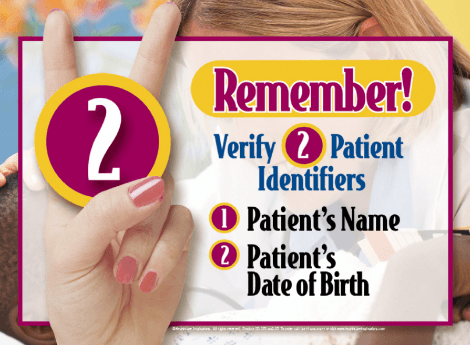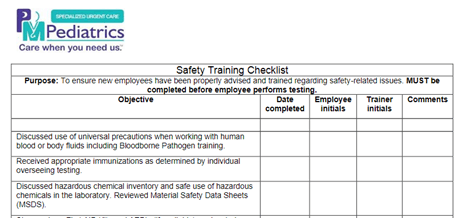Quality of Care
-Integrity in all dealings and communications
-Treat all patients as if they were a friend or family
- Respect and trust employees/colleagues
- Never be satisfied with the status quo/innovate
- Be cost efficient and mindful of need to be profitable
- Have fun 
What are our Core Values?
Waste, or combination of wastes, which because of its quantity, or physical, chemical or infectious characteristics may cause or significantly contribute to an increase in mortality or potential hazard to human health, safety of the environment when improperly stored, transported or disposed of.
What is the definition of hazardous and infectious waste?
-Rescue
-Activate
-Contain
-Extinguish
What does RACE stand for?
This is the response in the event of a known or suspected fire in the office. Please take a moment to identify where fire extinguishers are located.
Information related to an individual's past, present or future physical or mental health conditions as well as common identifiers such as name, address, birthdate and social security number. These items are not to be shared.
What is HIPAA?
Equipment worn to minimize exposures to hazards that cause serious workplace injuries and illnesses.
What is PPE? 
To make PM Pediatrics Care the obvious choice for parents whose children need immediate care. 
What is Our Mission?
- Blood
- Blood saturated items
- Suction canister
What items are disposed in a biohazardous waste bin? 
These are conducted at least twice a year during clinical hours and include all staff. The OM will document and keep on record.
What are Fire Drills?
Epinephrine 1:10,000, Epinephrine 1:1,000, Atropine, Narcan, Solu-Cortef, Lidocaine 2%, Diphenhydramine, Albuterol, Sodium Bicarbonate, Adenosine
What are some of the emergency medications found on the code cart?
One of the best ways to remove germs, avoid getting sick and prevent spread of germs to others. This is also celebrated every May by the World Health Organization.
What is Hand Hygiene?
To revoluntionize the way health care is delivered.
What is our Purpose?

- Personal Protective Equipment (PPE)
- Diapers
- IV Bags
- Medications
What items are not disposed of in the biohazardous waste unless visibly saturated with blood?
-Name
-Date of Birth
What are required Patient Identifiers? 
Always confirm upon every new encounter and also confirm when labeling patient lab specimens. Unlabeled specimens can cause adverse patient events such as wrong diagnosis, delay in care, or wrong treatment.
-no card box boxes on the ground
-no items under the sink
-all items removed from original shipping boxes
-signage posted correctly (no tape)
-no sharps in exam room
-strep kits cannot be left on counter
-no spray/aerosol deodorizers in patient bathrooms
-Cleaning wipes out of patient reach
-No food in same refrigerator with meds
What are some UCA requirements?
In between each patient and at the end of the shift nightly.
When do exam rooms get cleaned? (This includes but not limited to tables, chairs, remote controls, counter tops, faucet, and door knobs?
This policy is committed to encouraging an open and frank atmosphere in which any problem, complaint, suggestion or question receives a timely response from management.
What is our Open Door Policy? 
***DAILY DOUBLE***
3 Minutes

How many minutes does an area need to remain wet with a Sani-Cloth Wipe after an Infecious Waste Spill?
This item is posted conspicuously throughout office. It details the quickest route of egress, a seconday route of egress and the location of all fire extinguishers.
What is the Emergency Escape Plan?
-Blood Collection and Handling Policy
-Emergency Care and Equipment Policy
-Patient Sample Identification Policy
-Patient Transfer Policy
-Lactation Accommodation Policy
-DOH Reporting Policy (Animal Bite Policy)
What is found on Central PM under Company Hub in the Policy Section?
This list represents the use of possible dangerous medication abbreviations, symbols and dose designations. Use of such a list will help avoid medication errors with our patients.
FYI- It is reviewed/approved as required and at least every 3 years.
What is the "Do Not Use" Medication List?
We are committed to creating and maintaining a culture where inclusiveness is ingrained and practiced daily. We stand together to foster an environment of engagement, pride, and belonging.
What is our Diversity, Equity & Inclusion (DEI) Mission?
These are defined as discarded medical articles that may cause punctures or cuts.
What are Sharps?
Please log on to Central PM to brush up on Disposal of Hazardous & Infectious Waste Policy. If you have any questions, please discuss with your OM.
-These must always be stored in a vertical position
-they must always be stored in appropriate holders and not propped against a wall
-Never stored next to a flame or heat source
-Their regulator is in the off position when not in use
-Never stored in lab
What are Oxygen Cansisters?
Document to allow for a procedure or treatment that involves greater than minimum risk or any significant invasion of bodily integrity. This is also documented in EMR as well as scanned into the EMR.
What is Informed Consent?
This policy aims to reduce harm, increase quality and facilitate continuous improvement. It is used for internal, confidential documents and should not be released externally. Reminder: this report is not part of the EMR however if treated at location, the treatment is part of the EMR. Discuss with primary medical provider and immediate supervisor if needed at time of the event.
What is Safety Reporting?
Please log on to Central PM to brush up on policy & procedure. If you have any questions, please discuss with your OM.
The application used for patients and families requiring language translation services.
What is InDemand?
Note: Please familiarize yourself with this service so that we can continue to provide seamless care when language barriers are detected.
This is a document that contains information on potential hazards including chemicals that are used in the office. Staff is trained where to access and how to use them.
What are Material Safety Data Sheets (MSDS)?
If you have any questions, please discuss with your OM at your location.
This document is used to ensure that new employees have been properly advised and trained regarding safety-related issues.
What is the Safety Training Checklist?

This policy includes the following procedures: Weight, Heart Rate, Respiratory Rate, Pulse Oximetry, Temperature, and Blood Pressure.
What is the Vital Sign Policy?
This policy is to insure the accurate and consistent process of obtaining vital signs on patients. Vital signs are documented in the EMR.
Regardless of chief complaint this is done for patients 11 years old or older. Intake staff to introduce and administer prior to meeting provider.
What is Ask Suicide-Screening Questions (ASQ)?